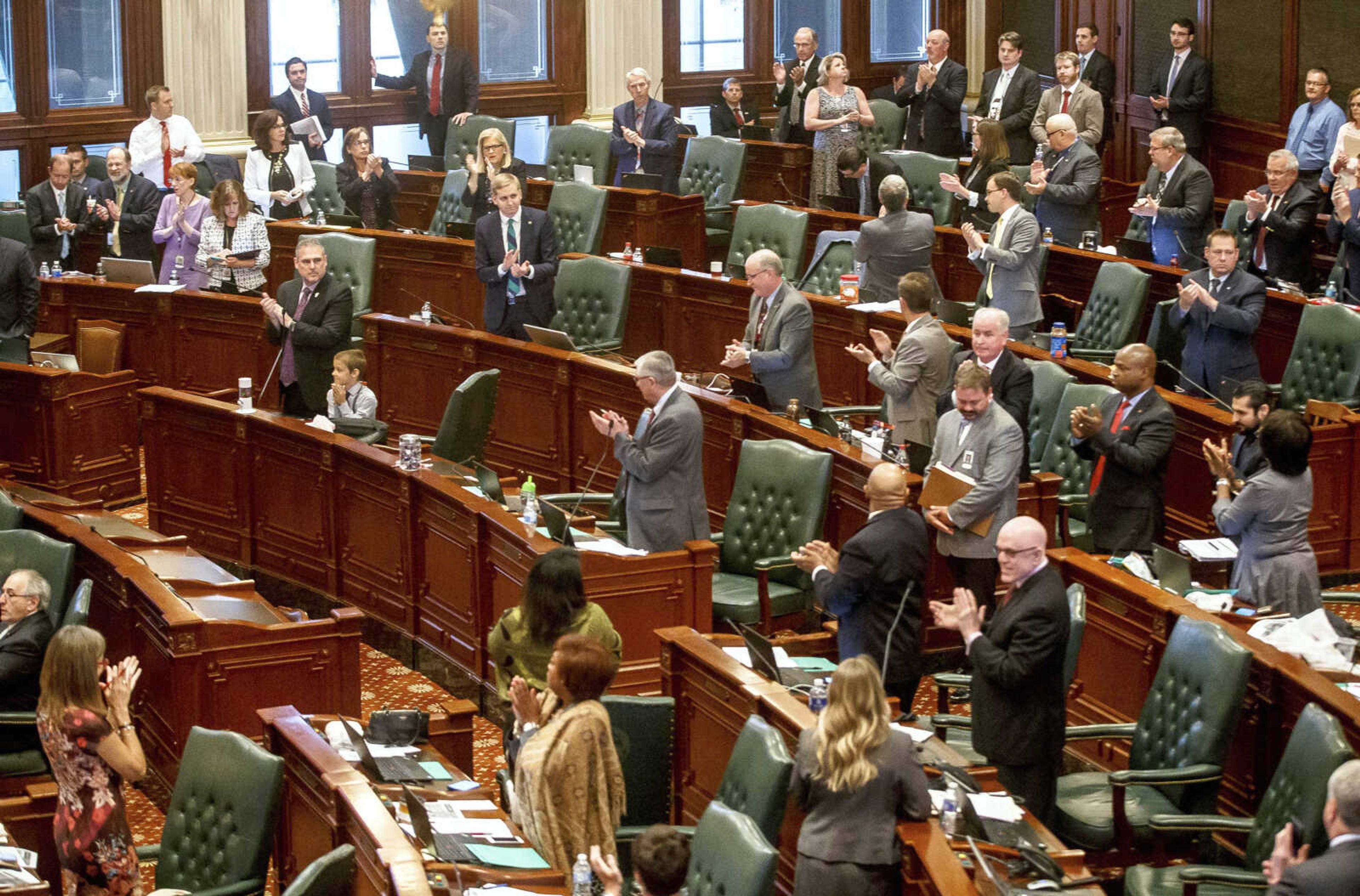Illinois pension buyouts may not bring savings budget claims
CHICAGO -- Illinois' new state budget relies on more than $400 million in savings from a new pension buyout plan finance experts caution is highly speculative and may not save as much money as lawmakers say. The budget sailed through the Legislature this week on a bipartisan vote, and Republican Gov. ...
CHICAGO -- Illinois' new state budget relies on more than $400 million in savings from a new pension buyout plan finance experts caution is highly speculative and may not save as much money as lawmakers say.
The budget sailed through the Legislature this week on a bipartisan vote, and Republican Gov. Bruce Rauner, who's seeking re-election in November, has said he'll act quickly to sign it. It was a sharp contrast to recent years, when Rauner and majority Democrats deadlocked over a budget and the governor's pro-business priorities, leading to the nation's longest state budget impasse.
The buyout plan is aimed at addressing Illinois' roughly $130 billion unfunded pension liability and the state's ballooning annual contributions to the funds. Protections enshrined in the state constitution have limited lawmakers' options, with the Illinois Supreme Court declaring cuts to benefits unconstitutional.
But the buyouts are voluntary, and there's no way to know for certain how many people will take the state up on the offer.
Often in deals like this, projected savings don't materialize or plans cost more than originally stated, said Steve Malanga, a fellow at the Manhattan Institute, a conservative think tank.
"So it's actually wise for taxpayers to be suspicious," he said.
Here's a look at the plan, and what it could mean for Illinois' budget:
What it does
The buyouts will be offered to people hired by the state before Jan. 1, 2011. Illinois plans to issue a maximum of $1 billion in bonds over three years to fund the lump sum payments.
One plan, for people no longer employed by the state, would provide a buyout estimated at 60 percent of the present value of their vested pension. The state estimates it will get enough state employees accepting the buyout to save $41 million in the fiscal year starting July 1.
The second plan is estimated to save Illinois $382 million in the coming budget year. It would give retirees an option to have their cost-of-living increases calculated at 1.5 percent rather than the current 3 percent, compounded annually, in exchange for an accelerated benefit payment.
What's in it for retirees
Rep. Mark Batinick, a Plainfield Republican who's been pushing the plan for several years, said he's heard from many retirees who would like to receive a large payment they can invest or use immediately, even if it means they get less money overall.
Some have health problems or family members with disabilities. Others want to get the largest portion of their promised retirement benefits at an age when they can still enjoy spending the money.
"There's a lot of reasons," Batinick said. "The fact is, this is their money, and they should have the ability to do with it what they want."
The math
Batinick said the first, smaller program is similar to one implemented in Missouri last year. Illinois assumed 22 percent of people eligible for the buyout would take it -- the same percentage as did so in Missouri.
Candy Albers Smith, communications manager for the Missouri State Employees' Retirement System, said more people took the buyout when it was offered again this spring, bringing the total participation rate to about 25 percent.
Illinois estimated about 25 percent of employees retiring in a given year would take the second offer of a smaller cost-of-living increase, Batinick said. He said that's a conservative estimate, noting private pension plan buyouts usually have participation rates between 30 percent and 50 percent, and people taking the buyout are only taking out a portion of their future retirement benefits.
But Malanga said private pension buyouts tend to get more takers because companies are often distressed, and retirees fear losing their pensions entirely. Government pensions are far more secure, even in places such as Illinois.
Comparing Illinois' offer with Missouri's is also risky. In Missouri, cost-of-living increases are set annually for anyone hired after 1997. In the past decade, the median increase for those covered by MOSERS has been 1.3 percent. The state also caps the total amount of the increases at 65 percent of the initial benefit.
Illinois has no cap, and the Illinois Supreme Court has ruled retiree benefits -- including the guaranteed 3 percent annual increase -- cannot be cut. Those factors could make Illinois' buyout offer far less attractive than Missouri's.
Budget impact
If Illinois doesn't get enough people to take the buyout and the $423 million in savings included in the new state budget isn't realized, lawmakers will have to cut elsewhere or run up more debt.
Malenga said that's why it would have been wiser for Illinois to attempt the buyout separate from the budget
Batinick noted he tried to do just that for many years.
"It didn't work," he said.
Follow Sara Burnett at https://twitter.com/sara--burnett
Connect with the Southeast Missourian Newsroom:
For corrections to this story or other insights for the editor, click here. To submit a letter to the editor, click here. To learn about the Southeast Missourian’s AI Policy, click here.









